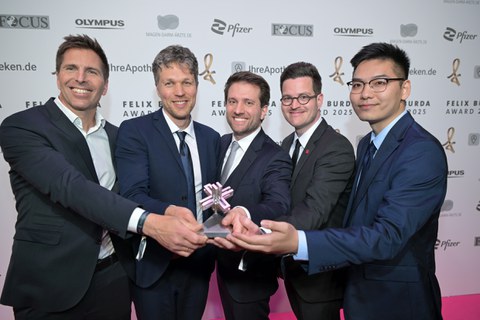May 12, 2025
Felix Burda Award 2025: Research team around Prof. Jakob N. Kather honored for AI project on colorectal cancer prognosis

Felix Burda Awards 2025 (from left to right): Dietmar Frey (Director Charité Lab for Artificial Intelligence in Medicine, laudator), Daniel Truhn (Clinic for Diagnostic and Interventional Radiology, University Hospital RWTH Aachen), Jakob Nikolas Kather (EKFZ for Digital Health), Sebastian Foersch (Institute of Pathology, University Medical Center Mainz), Xiaofeng Jiang (EKFZ for Digital Health). © Oliver Walterscheid for FBS / Hubert Burda Media
More precise diagnoses, better therapies: Using artificial intelligence, a research team at TU Dresden aims to significantly improve the chances of colorectal cancer patients and receives the renowned Felix Burda Award. The research team has developed a deep learning model that evaluates tissue samples and creates individual risk profiles. This helps physicians to better predict the progression of colorectal cancer in patients, allowing for more personalized and precise treatment.
"Prevention connects us..." was the motto when the Felix Burda Foundation rolled out the red carpet for the 20th time to honor outstanding achievements in colorectal cancer prevention. Prof. Jakob N. Kather, Xiaofeng Jiang, Prof. Daniel Truhn and PD Dr. Sebastian Försch received the Felix Burda Award in the "Medicine and Science" category on May 9 in Berlin on behalf of the entire research team. "Our research shows how powerful AI models already are today and what potential they have for healthcare in the future," said Prof. Kather, Professor of Clinical Artificial Intelligence at the Else Kröner Fresenius Center for Digital Health at TUD Dresden University of Technology and the University Hospital Dresden. "We are very pleased to be able to contribute to the treatment and prevention of colorectal cancer with artificial intelligence. This is a major societal challenge that we need to tackle together."
The award was also gladly received by Prof. Uwe Platzbecker, CEO of the University Hospital, who said: "We are proud to have Prof. Kather, a highly innovative physician, in our midst, whose commitment to AI-assisted colorectal cancer prevention has now been honored with the Felix Burda Award 2025." Prof. Esther Troost, Dean of the Medical Faculty of TU Dresden, added: "The Medical Faculty congratulates Prof. Kather on this prestigious award! We are delighted that he is conducting such successful research and teaching in the interdisciplinary field of Medical Data Sciences and Smart Technologies!"
AI model enables more precise predictions for colorectal cancer
Tissue sections from colorectal cancer samples contain valuable information that often remains unused. A research team led by Prof. Kather has developed and trained a deep learning model. This AI model automatically analyzes tissue samples and can classify patients into risk groups and predict their chances of survival more accurately than previous methods. Most importantly, the technology works regardless of where the exam is performed and is freely available. The open source code of the AI model allows other scientists around the world to access it, build on it and advance colorectal cancer research. The goal is to enable more personalized and effective therapies in the future, thereby improving outcomes for colorectal cancer patients. The jury recognized the study as an "outstanding example of translational research" that, with its innovative approach, "points far into the future of cancer medicine". In his laudatory speech, PD Dr. Dietmar Frey, Director of the Charité Lab for Artificial Intelligence in Medicine (CLAIM), explained that the results of this work enable risk assessment of patients and prediction of the further course of the disease. This, in turn, can contribute to personalized therapy and prolong life.
With glamour, glitter and a clear message - an evening dedicated to prevention
Colorectal cancer is the second most common cancer in Germany - and one of the few that can often be detected early through screening. However, colorectal cancer screening is often underestimated and considered taboo. Since 2003, the Felix Burda Foundation has been inviting cancer patients, scientists, politicians and celebrities to an annual event where it presents the Felix Burda Award for outstanding commitment to colorectal cancer prevention. Presenter Elena Uhlig, wearing a custom-made couture dress modeled after the human intestine and decorated with glittering intestinal polyps, gets to the heart of the matter: "We need to bring some glamour to the gut!"
The award was accepted by:
- Prof. Dr. med. Jakob Nikolas Kather (Else Kröner Fresenius Center (EKFZ) for Digital Health, TUD Dresden University of Technology and Carl Gustav Carus University Hospital Dresden; National Center for Tumor Diseases (NCT) Dresden/Heidelberg)
- Xiaofeng Jiang (Else Kröner Fresenius Center (EKFZ) for Digital Health, TUD Dresden University of Technology and Carl Gustav Carus University Hospital Dresden; Clinic for Diagnostic and Interventional Radiology, University Hospital RWTH Aachen)
- Prof. Dr. med. Daniel Truhn (Clinic for Diagnostic and Interventional Radiology, University Hospital RWTH Aachen)
- PD Dr. med Sebastian Försch (Institute of Pathology, University Medical Center Mainz)
Publication:
Xiaofeng Jiang, Michael Hoffmeister, Hermann Brenner, Hannah Sophie Muti, Tanwei Yuan, Sebastian Foersch, Nicholas P West, Alexander Brobeil, Jitendra Jonnagaddala, Nicholas Hawkins, Robyn L Ward, Titus J Brinker, Oliver Lester Saldanha, Jia Ke, Wolfram Müller, Heike I Grabsch, Philip Quirke, Daniel Truhn, Jakob Nikolas Kather: End-to-end prognostication in colorectal cancer by deep learning: a retrospective, multicentre study. The Lancet Digital Health, Volume 6, Issue 1, 2024. https://doi.org/10.1016/S2589-7500(23)00208-X
Else Kröner Fresenius Center (EKFZ) for Digital Health:
The EKFZ for Digital Health at TU Dresden and University Hospital Carl Gustav Carus Dresden was established in September 2019. It receives funding of around 40 million euros from the Else Kröner Fresenius Foundation for a period of ten years. The center focuses its research activities on innovative, medical and digital technologies at the direct interface with patients. The aim here is to fully exploit the potential of digitalization in medicine to significantly and sustainably improve healthcare, medical research and clinical practice.
Contact:
EKFZ for Digital Health
Anja Stübner and Dr. Viktoria Bosak
Public Relations
Tel.: +49 351 – 458 11379
digitalhealth.tu-dresden.de
